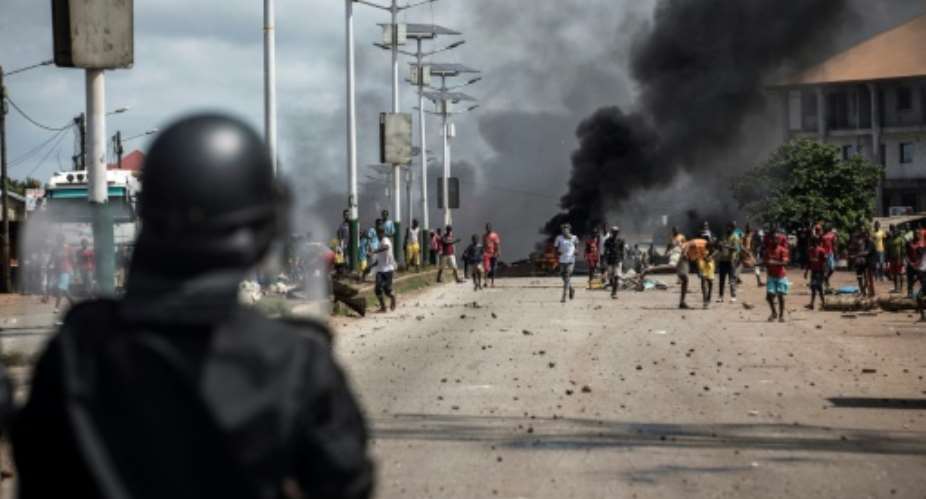Three people died in Guinea's capital Conakry on Wednesday in clashes between security forces and opposition supporters, a security official said, following a tense weekend presidential election.
"At least three people died today that I saw with my own eyes... and about 10 others were wounded," Mamadou Keganan Doumbouya told AFP.
Hadjiratou Barry, a resident of a Conakary district where clashes were taking place, also told AFP -- through tears -- that her brother had been shot dead.
And a local doctor, who declined to be named, said he had received two dead bodies, and nine injured people, at his clinic.
The unrest follows a high-stakes presidential election on Sunday, in which President Alpha Conde ran for a third term in a controversial bid that had already sparked mass protests in the West African country.
With tensions already running high, Guinea's main opposition leader Cellou Dalein Diallo on Monday declared victory in the election -- before the announcement of the official results, which are expected this week.
Opposition supporters are deeply suspicious about the fairness of the poll, although the government insists that it was fair.
Much of the tension in Guinea centres on Conde's candidacy.
Security forces repressed mass protests against the move from October last year, killing dozens of people.
In March, the 82-year-old president pushed through a new constitution which he argued would modernise the country. It also allowed him to bypass a two-term limit for presidents, however.
On Wednesday, plumes of black smoke rose over an opposition stronghold in the capital Conakry, where protesters erected barricades and lit fires, an AFP journalist saw.
Youths in alleyways also hurled stones at police officers stationed along a main artery who fired back tear gas cannisters.
In a social media post, Conde appealed for "calm and serenity while awaiting the outcome of the electoral process".
Clashes and barricades
Ten candidates are running for president alongside frontrunners Conde and Diallo, old political rivals who traded barbs in a bitter campaign.
Despite fears of violence after the pre-vote clashes, polling day was mostly calm.
Then Diallo's self-proclaimed election victory ratcheted up tensions, and celebrations by his supporters descended into violent clashes with security forces on Monday.
The opposition politician said that security forces killed three youngsters that night, although AFP was unable to confirm the details.
Security forces also barricaded Diallo inside his house, the politician said on Tuesday.
Monitors from the African Union and the 15-nation West African bloc ECOWAS both said that Guinea's election was mostly fair, despite insistence from Diallo's camp that it was fraudulent.
Diallo was prime minister under authoritarian leader Lansana Conte -- a fact that Conde underscored repeatedly on the campaign trail.
A former opposition activist himself, Conde became Guinea's first democratically elected president in 2010 and was re-elected in 2015.
Rights groups accuse him of veering towards authoritarianism, however, saying he is prone to fits of anger and reluctant to hold his security forces to account.





 Whoever participated in the plunder of the state must be held accountable – Jane...
Whoever participated in the plunder of the state must be held accountable – Jane...
 A vote for John and Jane is a vote to pull Ghana from the precipice of destructi...
A vote for John and Jane is a vote to pull Ghana from the precipice of destructi...
 I’ll repay your abiding confidence with loyalty, understanding and a devotion to...
I’ll repay your abiding confidence with loyalty, understanding and a devotion to...
 ‘I’ve learnt deeply useful lessons for the future' — Serwaa Amihere breaks silen...
‘I’ve learnt deeply useful lessons for the future' — Serwaa Amihere breaks silen...
 I’m sorry for the embarrassment – Serwaa Amihere apologises for leaked sex video
I’m sorry for the embarrassment – Serwaa Amihere apologises for leaked sex video
 Dumsor: Matthew Opoku Prempeh not in charge of Energy sector – Minority
Dumsor: Matthew Opoku Prempeh not in charge of Energy sector – Minority
 Adu Boahen’s murder: Police arrest house help who was in possession of deceased’...
Adu Boahen’s murder: Police arrest house help who was in possession of deceased’...
 Akufo-Addo nominates Felicia Attipoe as Tema West MCE
Akufo-Addo nominates Felicia Attipoe as Tema West MCE
 Election 2024: I can't have someone I defeated twice as my successor – Akufo-Add...
Election 2024: I can't have someone I defeated twice as my successor – Akufo-Add...
